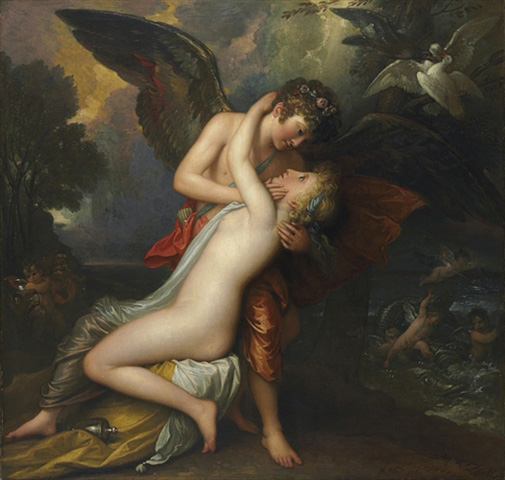Ode to Psyche:
A Critical Analysis:

With reference to Ode
to Psyche, Keats himself said in a letter to his brother:
“It is the first and only one with
which I have taken even moderate pains. I have, for the most part, dashed off
my lines in hurry”
Though it was written in hurry, it is Keats’ one of the most
perfect piece of poetic creations. Here the poet revives and recreates the
Psyche myth from Greek mythology. According to the Greek mythology, Psyche was
a beautiful nymph loved by Cupid, god of love. He visited her each night, but
departed at sunrise. Psyche was told never to attempt to discover his identity,
but her curiosity won out. One night she lit a lamp to see him. But some of the
burning oil dropped upon him. Awakened angry at being disobeyed, he left her.
Psyche wandered helplessly in search of her lover and became the slave of Venus
who imposed cruel tasks on her. Eventually she was reunited with Cupid and made
immortal. Because of her late arrival on Olympus ,
as Keats observed, she was never honoured and worshiped in the way of other
gods. He also explained in the same letter that Psyche was not regarded as a
goddess before the time of Apuleius, who lived after the Augustan age, and that
the goddess was never worshiped with any of the ancient fervour. Keats did not
wish to let a heathen goddess remain neglected. He therefore wrote this poem as
a tribute to her and attempted to restore her place among the gods and
goddesses.
The poem
begins with an invocation to Psyche apologizing for singing to her of herself:
“O Goddess!
hear these tuneless numbers, wrung
By sweet enforcement and remembrance dear,
And pardon
that thy secrets should be sung
Even into thine own soft-conched ear”
Then the poet describes that in a vision he has seen Psyche
and Cupid embracing each other in an idyllic surrounding in a forest. They sat beneath
“ the whispering roof of leaves and trembled blossoms.” A brook, hardly
visible, because of the thick grass that grows on its bank, ran by them. Amidst
the deep grass and soft and fragrant flowers, they were found in an intimate
moment:
“Mid hush'd,
cool-rooted flowers, fragrant-eyed,
Blue,
silver-white, and budded Tyrian,
They lay
calm-breathing, on the bedded grass;
Their
arms embraced, and their pinions too;”
Then the poet praises Psyche’s beauty abundantly. He says
that her beauty is unparalled among the Greek gods and goddesses living in mount Olympus
The ode has
often been seen as an extended metaphor about poetry, a reading that can be
supported by an analysis of the development of ideas in relation to structure.
Keats restores and recreates the forgotten Psyche myth twice in this poem and
these recreations occurs within the two tableaux which frame the ode. When the
poet asks, “Surely I dreamt to-day, or did I see/ The winged Psyche with
awaken'd eyes”, he introduces the first recreation. Here she is represented in
a mythological past world, a forest bower,
a place exterior to the passive poet’s mind and accessible by dream or
vision. The second recreation occurs when he vows to be her priest. Here she is
more consciously and artfully recreated within the bower of poet’s mind and
brought into the present. The movement from one tableaux to another is
complemented by a change from the language of erotic experience to the language
of aesthetic experience. The first lush natural setting is firmly anchored in
sense impressions while the description in the final tableaux is too
consciously artful. There is movement from the warm language of physical love
to the cooler language of religious formality. Thus the poem illustrates the
process of poetic creation – from sensation to sublimity. Some critics have
seen this ode as an allegory of soul which has not been recognized until modern
times.
The ode is
typically Keatsian for being utterly sensual in nature. It contains plenty of
sensual and synaesthetic images. The description of pastoral landscape in
which Cupid and Psyche spend their blissful moment is richly sensuous. Different
expressions like - ‘Whispering roof of leaves’, ‘cool-rooted’ and
‘fragrant-eyed’ flowers, and ‘bedded grass’ appeal to our different senses.
No comments:
Post a Comment